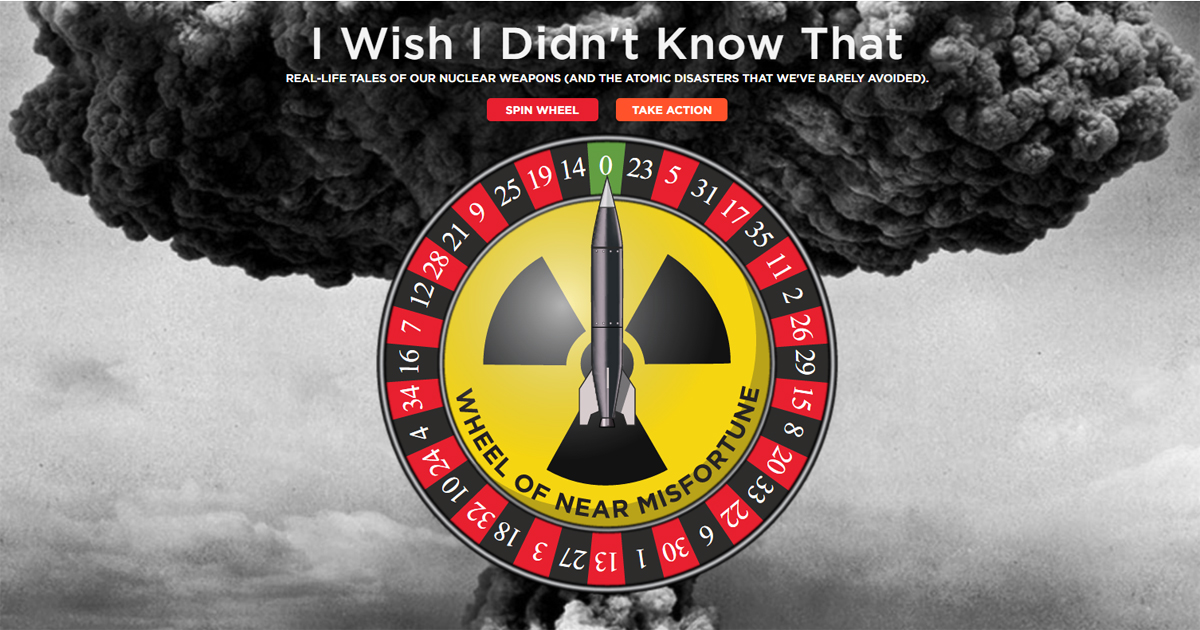-
Speak out now and urge your members of Congress to join a growing chorus calling for the only sensible path forward—direct talks with North Korea and patient diplomacy.
Nuclear Weapons
Multimedia
Bet you don't know how many weapons we have—or what they're capable of >
The absurd history of nuclear weapons deserves a spin >
We rely on your support
Take action
What’s at Stake
Nuclear weapons: the most destructive, indiscriminate, and world-altering weapons ever invented.
You might think that an accidental launch couldn’t occur. You might assume that the US only has a small number of weapons, and that using them would require careful deliberation by our nation’s leaders.
You’d be wrong.
The President can independently order the launch of nuclear weapons at any time and for any reason. At his command are several thousand warheads, hundreds of them on hair-trigger alert.
Over the coming years, the Pentagon plans to spend another $1 trillion of taxpayer money to build a new generation of nuclear bombs and delivery systems—and Congress is poised to let it happen.
These policies and plans increase the risk of nuclear war in very real and dangerous ways, and they need to change. That’s why we’re fighting to reduce the risk of nuclear use.
Together with other security experts and leading scientists, we develop and advocate for non-partisan policies that move US and global security forward.
You can help. Visit our action center, join our Science Network, donate, and use and share our materials to help prevent the unthinkable.
Solutions for a Safer World

Photo: NNSA/CC BY-ND (Flickr)
With the right policy shifts on nuclear weapons, terrorism, and related issues, we can ensure that good science helps keep the United States safe.
Remove hair-trigger alert
Cold War-era policies shouldn’t determine how we manage nuclear warheads today—especially when those policies create undue risk.
Learn more about hair-trigger alert >
Change US nuclear weapons policy
Hair-trigger alert isn’t the only outdated policy. Significant arms reductions and a “sole use” policy for nuclear bombs and missiles will significantly enhance US security.
Learn more about nuclear weapons policy >
Prevent nuclear terrorism
Some countries “reprocess” used fuel from nuclear power plants, creating material that’s usable in nuclear devices. Avoiding this unnecessary step both domestically and abroad is crucial for preventing nuclear terrorism.
Learn more about nuclear terrorism >
Re-evaluate missile defense
US missile defense is expensive, ineffective, and may undermine national security. Not expanding missile defense sites in the United States—and demanding better testing and accountability—will improve US security.
Learn more about US missile defense >
Strengthen relations with China
Peaceful relationships depend on good information, not political rhetoric or hyperbole. Clearly communicating US and Chinese intentions is essential for maintaining a cooperative relationship.
Learn more about US-China relations >
Enhance space security
With more satellites in orbit than ever before, avoiding space-based conflicts is a top priority. Smart planning and thoughtful safeguarding—not weaponization—will protect US interests in space.
Learn more about enhancing space security >
Summer Symposium

Photo: UCS/David Wright
Our annual summer symposium brings together young scientists from across the globe to discuss international security and arms control issues. Topics include nuclear arsenals, proliferation, verification, missile defense, and more.
Learn more about our symposium and related lectures on global security >
Get Involved
-

Get involved in your community
Share the word about nuclear risks—every voice helps!
-

We depend on your support
Help reduce the risks of a nuclear accident today.












